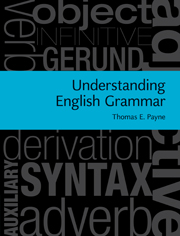Book contents
- Frontmatter
- Contents
- List of figures
- List of tables
- Preface
- Acknowledgements
- List of typographical conventions and abbreviations
- Introduction
- 1 History
- 2 Typology
- 3 The lexicon
- 4 Morphology – the shapes of words
- 5 Participant reference
- 6 Actions, states, and processes
- 7 Basic concepts in English syntax
- 8 Advanced concepts in English syntax
- 9 Complementation
- 10 Modification
- 11 Auxiliaries and the “black hole” of English syntax
- 12 Time and reality
- 13 Voice and valence
- 14 Clause combining
- 15 Pragmatic grounding and pragmatically marked constructions
- Glossary
- Endnotes
- References
- Index
3 - The lexicon
Published online by Cambridge University Press: 05 June 2012
- Frontmatter
- Contents
- List of figures
- List of tables
- Preface
- Acknowledgements
- List of typographical conventions and abbreviations
- Introduction
- 1 History
- 2 Typology
- 3 The lexicon
- 4 Morphology – the shapes of words
- 5 Participant reference
- 6 Actions, states, and processes
- 7 Basic concepts in English syntax
- 8 Advanced concepts in English syntax
- 9 Complementation
- 10 Modification
- 11 Auxiliaries and the “black hole” of English syntax
- 12 Time and reality
- 13 Voice and valence
- 14 Clause combining
- 15 Pragmatic grounding and pragmatically marked constructions
- Glossary
- Endnotes
- References
- Index
Summary
We don't just borrow words; on occasion English has pursued other languages down alleyways to beat them unconscious and rifle their pockets for new vocabulary.
Booker T. WashingtonIn Chapter 2 we discussed how English compares to other languages in terms of morphology, syntax, and lexicon. One conclusion of Chapter 2 was that the lexicon of English is one of its richest resources for expressing meaning. English language professionals will do well to study the lexicon carefully, as many tasks performed by morphological and syntactic means in other languages are expressed by lexical choices in English.
In linguistics, the lexicon of a language is normally defined as a network of all the individual pieces of information a person must have stored in memory in order to speak the language. While there is much variation in theoretical approaches to how such information is represented in the mind, there is general agreement that the lexicon consists at least of the set of basic units, or form–meaning composites, that make up a language – the storehouse of raw materials used to construct communicative utterances. The lexicon is sometimes contrasted with morphology and syntax, which, in some approaches, are distinct components of grammar consisting of structural patterns for constructing new utterances. If the lexicon is the storehouse of raw materials, the morphology and syntax (or morphosyntax) are the building codes for combining those raw materials into meaningful utterances.
- Type
- Chapter
- Information
- Understanding English GrammarA Linguistic Introduction, pp. 57 - 80Publisher: Cambridge University PressPrint publication year: 2010

